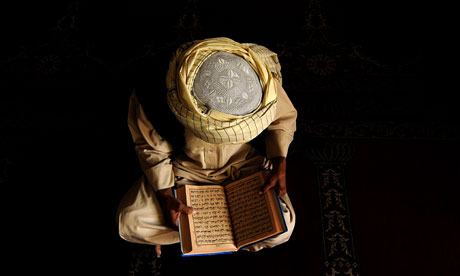a muslim scholar who disagrees with everyone else about the age of Aisha, when the shyt is even planted in the goddamn book.
Of course he has a conflict of interest...

I've heard it all with you mosque filling idiots.
"Oh...she was 13 when they got married...but the marriage wasn't consummated until later" 
"oh...that was normal back then..." 
"She was actually 23 years old..." 
"its a translation error..." 
The next time you pray, I hope its in the direction of your nearest library, and not mecca.
 http://www.theguardian.com/commentisfree/belief/2012/sep/17/muhammad-aisha-truth
The truth about Muhammad and Aisha
http://www.theguardian.com/commentisfree/belief/2012/sep/17/muhammad-aisha-truth
The truth about Muhammad and Aisha
Innocence of Muslims repeated the claim Muhammad was a paedophile, but the story is more complex and interesting than that
'The Qur’an says that marriage is valid only between consenting adults, and that a woman has the right to choose her own spouse.' Photograph: Shah Marai/AFP/Getty Images
Writing about Muhammad, the prophet of Islam, the Orientalist scholar W Montgomery Watt wrote: "Of all the world's great men, none has been so much maligned as Muhammad." His quote seems all the more poignant in light of the Islamophobic film Innocence of Muslims,
which has sparked riots from Yemen to Libya and which, among other slanders, depicts Muhammad as a paedophile.
This claim is a recurring one among critics of Islam, so its foundation deserves close scrutiny.
Critics allege that Aisha was just six years old when she was betrothed to Muhammad, himself in his 50s, and only nine when the marriage was consummated. They base this on a saying attributed to Aisha herself (Sahih Bukhari volume 5, book 58, number 234), and the debate on this issue is further complicated by the fact that some Muslims believe this to be a historically accurate account. Although most Muslims would not consider marrying off their nine-year-old daughters, those who accept this saying argue that since the Qur'an states that marriage is void unless entered into by consenting adults, Aisha must have entered puberty early.
They point out that, in seventh-century Arabia, adulthood was defined as the onset of puberty. (This much is true, and was also the case in Europe: five centuries after Muhammad's marriage to Aisha, 33-year-old King John of England married 12-year-old Isabella of Angoulême.) Interestingly, of the many criticisms of Muhammad made at the time by his opponents, none focused on Aisha's age at marriage.
According to this perspective, Aisha may have been young, but she was not younger than was the norm at the time. Other Muslims doubt the very idea that Aisha was six at the time of marriage, referring to historians who have questioned the reliability of Aisha's age as given in the saying. In a society without a birth registry and where people did not celebrate birthdays, most people estimated their own age and that of others. Aisha would have been no different.
What's more, Aisha had already been engaged to someone else before she married Muhammad, suggesting she had already been mature enough by the standards of her society to consider marriage for a while. It seems difficult to reconcile this with her being six.
In addition, some modern Muslim scholars have more recently cast doubt on the veracity of the saying, or hadith, used to assert Aisha's young age. In Islam, the hadith literature (sayings of the prophet) is considered secondary to the Qur'an. While the Qur'an is considered to be the verbatim word of God, the hadiths were transmitted over time through a rigorous but not infallible methodology.
Taking all known accounts and records of Aisha's age at marriage, estimates of her age range from nine to 19.
Because of this, it is impossible to know with any certainty how old Aisha was. What we do know is what the Qur'an says about marriage: that it is valid only between consenting adults, and that a woman has the right to choose her own spouse. As the living embodiment of Islam, Muhammad's actions reflect the Qur'an's teachings on marriage, even if the actions of some Muslim regimes and individuals do not.
Sadly, in many countries, the imperatives motivating the marriage of young girls are typically economic. In others, they are political. The fact that Iran and Saudi Arabia have both sought to use the saying concerning Aisha's age as a justification for lowering the legal age of marriage tells us a great deal about the patriarchal and oppressive nature of those regimes, and nothing about Muhammad, or the essential nature of Islam. The stridency of those who lend credence to these literalist interpretations by concurring with their warped view of Islam does not help those Muslims who seek to challenge these aberrations.
The Islamophobic depiction of Muhammad's marriage to Aisha as motivated by misplaced desire fits within a broader Orientalist depiction of Muhammad as a philanderer. This idea dates back to the crusades. According to the academic Kecia Ali: "Accusations of lust and sensuality were a regular feature of medieval attacks on the prophet's character and, by extension, on the authenticity of Islam."
Since the early Christians heralded Christ as a model of celibate virtue, Muhammad – who had married several times – was deemed to be driven by sinful lust. This portrayal ignored the fact that before his marriage to Aisha, Muhammad had been married to Khadija, a powerful businesswoman 15 years his senior, for 25 years. When she died, he was devastated and friends encouraged him to remarry. A female acquaintance suggested Aisha, a bright and vivacious character.
Aisha's union would also have cemented Muhammad's longstanding friendship with her father, Abu Bakr. As was the tradition in Arabia (and still is in some parts of the world today), marriage typically served a social and political function – a way of uniting tribes, resolving feuds, caring for widows and orphans, and generally strengthening bonds in a highly unstable and changing political environment. Of the women Muhammad married, the majority were widows. To consider the marriages of the prophet outside of these calculations is profoundly ahistorical.
What the records are clear on is that Muhammad and Aisha had a loving and egalitarian relationship, which set the standard for reciprocity, tenderness and respect enjoined by the Qur'an. Insights into their relationship, such as the fact they liked to drink out of the same cup or race one another, are indicative of a deep connection which belies any misrepresentation of their relationship.
To paint Aisha as a victim is completely at odds with her persona. She was certainly no wallflower. During a controversial battle in Muslim history, she emerged riding a camel to lead the troops. She was known for her assertive temperament and mischievous sense of humour – with Muhammad sometimes bearing the brunt of the jokes. During his lifetime, he established her authority by telling Muslims to consult her in his absence; after his death, she went to be become one of the most prolific and distinguished scholars of her time.
A stateswoman, scholar, mufti, and judge, Aisha combined spirituality, activism and knowledge and remains a role model for many Muslim women today. The gulf between her true legacy and her depiction in Islamophobic materials is not merely historically inaccurate, it is an insult to the memory of a pioneering woman.
Those who manipulate her story to justify the abuse of young girls, and those who manipulate it in order to depict Islam as a religion that legitimises such abuse have more in common than they think. Both demonstrate a disregard for what we know about the times in which Muhammad lived, and for the affirmation of female autonomy which her story illustrates.
• This article was amended on 17 September 2012. It originally stated that King John was 44 when he married Isabella of Angoulême. This has been corrected.
 and you need to grow up.
and you need to grow up.

 Hmmmm...now where have I heard that before?
Hmmmm...now where have I heard that before? 









